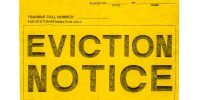All right, so I am going to show you a walkthrough of a property that we just had a tenant move out of. We gave them a 120-day notice that we were not going to renew the lease. So we signed a 12-month lease with them and probably didn't do a very good job of tenant selection. We looked over a couple of things that I knew better than to look over, and at the end of the day, that proved to bite us. So here's what happened.
Twelve months ago, we told them we're signing this lease. You know, rent is due on the first, you're late on the fifth, and you're going to get evicted on the 10th. So, three or four times throughout the first seven or eight months, they were late. We explained what the rules were. For some reason, they couldn't quite understand that the payment was due on the first of the month.
We even made arrangements with them that we would allow payments to be paid on the 5th between the 5th and the 10th with no penalty if they would just show us documentation as to how they got paid. So, we went through that for three or four months. They never showed us, but ultimately, I want to show you this because this is the part of being a landlord that doesn't show up on a profit and loss statement. It doesn't show up on a pro forma, but if you're going to rent property, you need to get used to seeing this.
Let's just do a quick one-minute walkthrough here. They left us what appears to be 15 gallons of hydraulic oil—that's awesome. They left us tons of personal trash here, gotta love that. More trash here, and all of this trash, mind you, we haven't even gone in the building yet. This is what they left us on the outside, and then there are all the tires and wheels that they left us.
A bunch of stuff on the screened-in porch. When they moved in, this screened-in porch had a door right there. It is nowhere to be found now, so I guess they felt like that was something they should probably take with them. They broke into the storage building and left the door open, so who knows what's going on down there.
They didn't clean the gutters or do any of the outdoor maintenance they agreed to do, but we've already got a dumpster—shout out to Trinity Disposal. This podcast is sponsored by Trinity Disposal. I wish it was sponsored; it would cost us less money. You can see over there, they didn't do any landscaping. You see the eviction notice there.
All right, you've got a couch they didn't want, a whole bunch of trash. They left us a little present right there with some busted sheetrock, and they took every single light bulb that they could take. They broke the floor right there. How you break LVT or LVP, I'm not real sure, but they sure enough did. That's the third refrigerator we've had to put in here, the third new refrigerator that we've put in here because somehow they kept tearing them up.
For these tenants—and then, yo, wait, let's see what they did there. The blinds are all jacked up everywhere. They left us some more trash. Dr. Pepper bottle—actually, a Coke in the corner that still has Coke in it—that's amazing. Thank you for leaving more trash here. The shower curtain was pulled down off the wall—that's amazing. Then they left us a room full of clothes that they didn't want and shoes and all kinds of other things. Yeah, that is the life of a landlord when you don't choose your tenants carefully.
I'm going to go in and look at these other two bedrooms real quick, and oh yeah, they also cut the power off before they moved out. They didn't tell us they were moving. They were supposed to be here until May 31st, and then they decided to leave without telling us and without paying their April rent.
Of course, those things on the wall are pieces of tape, and you got some stars on that wall and some other things they put on the wall over here, all of which, of course, we told them were not allowed to be put on the wall. I don't know how you mess up an air vent like that, but they sure enough did that. A little bit more trash in here, not sure what they had behind that wall, but nonetheless, that is the case. Just kind of scuffed up the closet there. I'm almost afraid to open this bathroom door, but there it is. Vanity, shower—they took the shower curtain, took the light bulb out of the fan, obviously never cleaned the fan, left us a bag of trash right here hanging on the door.
So yeah, that is the life of being a landlord. Just didn't want you to think it was all rainbows and sunshine. Sometimes you gotta fill up the Trinity dump.
How to Avoid Problem Tenants in Georgia
The life of a landlord isn’t all rainbows and sunshine!
If you don’t do your due diligence, landlording can be anything but rewarding. A bad tenant, in particular, can not only be a threat to your safety and well-being, but also a huge inconvenience in your life.
That’s why savvy landlords pay the most focus on trying to find the right tenant. You will want to find a tenant who cares for your property and abides by the terms of the lease agreement.
So, how exactly can a landlord avoid a problem tenant in Georgia? The following are some tips to get you started.
1. Pre-screen tenants
Your goal is to land an impressive tenant. One that understands their responsibilities once they begin living on their rented premises. As you pre-screen prospective tenants via a call or email, make sure to find as much information about them as possible.
The following are some pre-screening questions you can ask prospective tenants.
- When are you looking to move in? Look for tenants who are looking to move in immediately. Remember, rent is the bread and butter of your investment. And you won’t get paid if it stays vacant.
- Have you ever been evicted before? Look for a prospect with a clean slate. A history of no evictions means that the tenant is responsible and is more likely to abide by the rules.
- How much do you make? This can tell you whether the tenant fits the criteria off the bat. If the prospect can’t afford the rent, move on to the next prospect.
2. Require prospects to fill out an application form.
Failing to ask new tenants to do this is one of the main reasons why landlords have bad experiences. In addition to pre-screening prospects, you’ll also want to require them to fill out a rental application form.
The more information you collect from prospects the easier it’ll be for you to make an informed decision. The following are some bits of information you should look for.
- Employment status
- Monthly income
- Credit rating
- Employment history
- Landlord references
- Criminal history
- Contact information
3. Verify the prospect’s rental background.
Without verification, it can be easy for a tenant to paint a rosy picture of their rental past. It isn’t uncommon for prospects to exaggerate or even fabricate the information on their applications.
To verify a prospective tenant’s information, you’ll need to make calls to prior landlords and current employer.
Ask prior landlords the following questions.
- Did the tenant pay rent on time?
- Did the tenant report maintenance issues on time?
- Would you rent to the tenant again? If not, why?
As for the employer, you may want to ask them the following questions.
- Is the tenant reliable and responsible?
- How much does the tenant make per month?
- What employment terms is the tenant on?
4. Be detailed with the lease agreement.
A lease is an important document for a savvy landlord to have. Use it to clarify each party’s duties and responsibilities. Including:
- How much is rent and when it falls due?
- Who is responsible for maintaining what?
- How much is the security deposit as well as other fees?
- Right of landlord entry and the notice requirements.
- The duration of the lease.
- The notice requirements regarding lease termination.
Don’t leave anything to their imagination. This will only create room for misunderstanding or confusion.
Conclusion
Problem tenants can cause you a great deal of stress. Luckily for you, you may be able to minimize those chances by doing your due diligence. Screening tenants can help you separate the serious tenants from the time-wasters.
Last Updated on May 29, 2024 by Kelvin Nielsen

Hi, I’m Kelvin Nielsen, an experienced landlord and accomplished real estate lawyer. My focus is on answering your questions about renting in the hopes of making your life as a renter or a landlord a bit easier.








